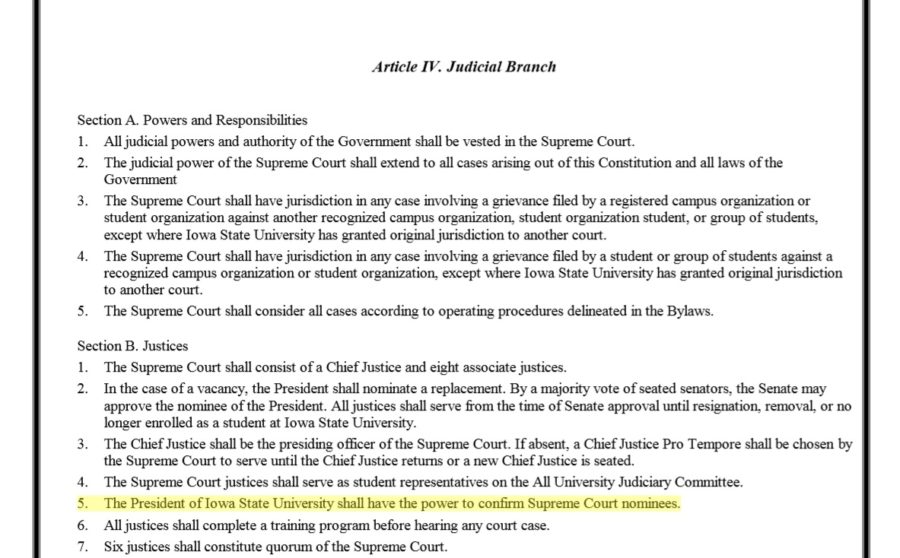Editorial: University president should not hold power in StuGov Supreme Court nominations
The Student Government constitution states the president of Iowa State University has the power to confirm appointments to the Student Government Supreme Court.
August 31, 2015
The president of Iowa State is influential in ensuring students have a positive experience while at the university.
But the president is not a student, and therefore should have no role in choosing the members of any part of Student Government.
And that includes approval of the Student Government’s judicial branch nominees.
While the president has the best interest of the university in mind, he or she should not be involved in any decision making when it comes to the Student Government, because it is a separate governing board charged with representing the student body and keeping the administration accountable to those students.
The Student Government, which mirrors the federal government, is made of three branches: executive, which includes the president, vice president and executive cabinet; legislative, which is the Student Senate; and the judicial, which is the nine Supreme Court justices who decide cases involving ISU students.
Last week, the Student Government proposed a bill that would get rid of the portion of its Constitution that says the ISU president has the power to confirm Student Government Supreme Court nominees. Student Government Supreme Court justices must be nominated by the Student Government president and confirmed by the Senate.
Sen. Cole Button, who authored the bill, said the proposed amendment would ensure that only the Senate can confirm nominees.
Button said he and other senators with whom he spoke about the bill wanted “to make sure the power to confirm Student Government Supreme Court nominees is decided entirely by students … that there’s no risk of some future university president [overstepping their bounds].”
The main job of the Supreme Court, made up of nine undergraduate or graduate students, is to judge cases involving ISU students, including grievances filed by individual students or student organizations against other students or organizations, according to the description provided by Student Government.
Another role of the Supreme Court is to enforce and interpret the Student Government Constitution, and to make sure actions taken by the executive and legislative branches fall in line with the Constitution.
These justices also fill a portion of the 10 students appointed to the All University Judiciary, a body that hears cases involving a serious violation of the Student Code of Conduct, in which the case could result in a student’s suspension or even expulsion from the university.
While not all appointments to this all-university board are necessarily approved by or involve the president, all appointments are subject to the approval of the president, according to the All University Judiciary website.
Button said the amendment wouldn’t take away the president of the university’s power to approve or deny justices on the All University Judiciary. Student Government would still select justices to sit on the All University Judiciary and the president of the university would still be able to approve or deny justices.
Button said he didn’t know if a president has ever rejected a Supreme Court nominee of the Student Government, but said the power hasn’t been used in his time on Student Government.
This could have served as a potential obstacle for the amendment, but Button reached out to President Steven Leath to notify him of the upcoming vote, to which Leath told Button he approved, Button said.
If Student Government senators and Leath both agree the president of the university has no purpose in any decision-making when it comes to the Student Government, there is no reason this amendment shouldn’t pass.







